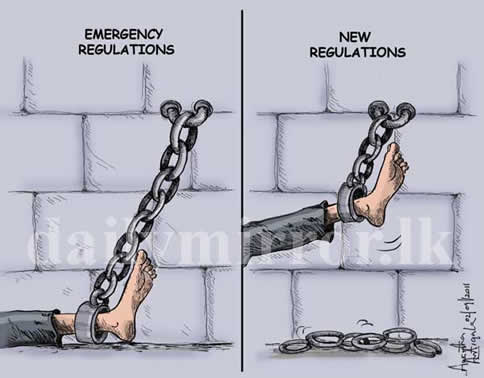Sri Lanka Replaces Lifted Powers for Military
by Tamil Guardian, London, August 31 & September 2, 2011
|
The latest move by Colombo will continue to block any resettling of displaced Tamil civilians.
The new regulations will also allow the authorities to continue to hold thousands of Tamils in custody without charge...
"The military can't play a role in keeping law and order and military check points will not be possible," he said adding that the military will also have to keep away from civil administration in the former war zones in the north.
The new powers accorded the military this week means these will not happen. |
 Sri Lanka put in place tough new regulations under the Prevention of Terrorism Act, even as the near identitical Emergency Regulations ended. Sri Lanka put in place tough new regulations under the Prevention of Terrorism Act, even as the near identitical Emergency Regulations ended.
The new laws have been introduced under the PTA, allowing the authorities to maintain the militarised high-security zones in the Tamil parts of island.
High security zones (HSZ) are swathes of residential areas occupied by the military during past offensives and converted into permanent encampments, displacing tens of thousands of families from their homes.
The latest move by Colombo will continue to block any resettling of displaced Tamil civilians.
The new regulations will also allow the authorities to continue to hold thousands of Tamils in custody without charge.
Warrantless arrests and searches are set to continue under these new regulations, which are seen as a temporary measure until a more permanent ‘Emergency Consequential Provisional Bill’ is enacted in Parliament.
See Reuters report here.
According analyst Jehan Perera, the lifting of the Emergency powers should have meant the people's "freedom to engage in public political activity will be enhanced."
"The military can't play a role in keeping law and order and military check points will not be possible," he said adding that the military will also have to keep away from civil administration in the former war zones in the north.
The new powers accorded the military this week means these will not happen.
Defending the new powers, Sri Lanka Attorney General Mohan Peiris told reporters,
“We will leave no room for de-proscription of the LTTE and the invalidation of the High Security Zones."
Also, we need these new regulations to deal with LTTE surrenders and detainees. There will not be any respite in this case, though the emergency lapses."
See the Daily Mirror's report here.
The PTA itself has been heavy criticised by international human rights organisations for it allows the security forces to hold prisoners indefinitely without charge and provides them with impunity for rights violations, including torture of detainees.
After its introduction as a 'temporary' law in 1979, the Prevention of Terrorism Act has been permanently in place since 1981.
The Emergency Regulations have also been in place for three decades, before being lifted with much fanfare last week - just weeks before the UN Human Rights Council is to meet in Geneva.
Sri Lanka is sending a delegation to defend the regime against growing accusations of mass killings of Tamil civilians during the final months of the war in 2009.
------------------------------------------------------------------------------------------
Out with the old, in with the … old
September 2, 2011
"On one hand, they abolished the emergency laws to satisfy the international community, while on the other hand, they bring in new regulations to the PTA, which itself is a draconian law. We oppose this move. We have always been calling to abolish the PTA, too."
"What's the use of abolishing emergency laws if they include the same tough laws in the PTA? This will not help to strengthen democracy at all."
- Suresh Premachandran, senior leader of the Tamil National Alliance, referring to Sri Lanka's extensions to the Prevention of Terrorism Act (PTA).
See the report by the Associated Press here.
“The evidence suggests that Mr Rajapaksa is not fond of relinquishing power. … With so much left murky, the worry is that the president will sneak in through the back door what he shoved out of the front.”
- The Economist. See the report, written between the lifting of the old regulations and the introduction of the new ones, here.
|  Home
Home Archives
Archives Sri Lanka put in place tough new regulations under the Prevention of Terrorism Act, even as the near identitical Emergency Regulations ended.
Sri Lanka put in place tough new regulations under the Prevention of Terrorism Act, even as the near identitical Emergency Regulations ended.